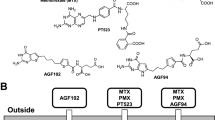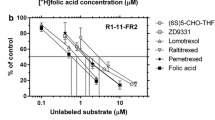Abstract
Two methotrexate (MTX)-resistant human breast-cancer cell lines with impaired transport via the reduced folate carrier (RFC), one established in vitro (MTXR-ZR-75-1) and another inherently resistant (MDA-231), were adapted to grow in medium containing 2 nM folic acid. This induced the expression of previously undetectable membrane folate receptors (MFR) to levels of 8.2 and 2.3 pmol/107 cells, respectively. Polymerase chain reaction (PCR) quantitation revealed that MFR messenger-RNA levels of the isoform first described in human nasopharyngeal carcinoma KB cells (MFR-α) were increased in low-folate-adapted MTXR-ZR-75-1 cells, whereas placental transcripts (MFR-β) coincided with MFR-α expression in low-folate (LF)-adapted MDA-231 cells. These cell lines were used to study the role of MFR in the uptake and growth-inhibitory effects of five different antifolates with varying affinities for MFR: N 10-propargyl-5, 8-dideazafolic acid (CB3717) > 5,10-dideazatetra-hydrofolic acid (DDATHF) > N-{5- [N-(3,4-di-hydro-2-methyl-4-oxoquinazolin-6-methyl)-N-methyl-amino] -2-theonyl}-glutamic acid (ZD1694) ≫ MTX > edatrexate (EDX). Expression of MFR only slightly decreased the resistant phenotype for MTX, EDX, and ZD1694, suggesting that these drugs are not transported intracellularly to cytotoxic concentrations at these levels of MFR expression. On the other hand, both cell lines became from at least 180- to 400-fold more sensitive to growth inhibition by CB3717 and DDATHF, which may be correlated with their high affinity for MFR. These sensitivity/resistance profiles were largely similar following cell culture in medium containing 1 nM L-leucovorin, a folate with an affinity for MFR 10-fold lower than that of folic acid, the one exception being the increased sensitivity for ZD1694 seen in the LF-adapted cells with the highest level of MFR expression (MTXR-ZR-75-1). These results illustrate that the efficacy of MFR in mediating antifolate transport and cytotoxicity depends on their affinity for the folate antagonist, their degree of expression, and the levels of competing folates.
Similar content being viewed by others
Author information
Authors and Affiliations
Additional information
Received: 27 February 1995/Accepted: 19 October 1995
Rights and permissions
About this article
Cite this article
Pinard, MF., Jolivet, J., Ratnam, M. et al. Functional aspects of membrane folate receptors in human breast cancer cells with transport-related resistance to methotrexate. Cancer Chemother Pharmacol 38, 281–288 (1996). https://doi.org/10.1007/s002800050483
Issue Date:
DOI: https://doi.org/10.1007/s002800050483




